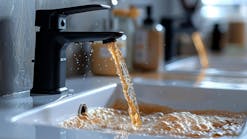Water scarcity is a universal and growing issue. With huge projected population growth, this problem will only continue to increase. The World Economic Forum reported that the world’s population surpassed 7 billion in 2011, and is expected to reach 9.3 billion by 2050. Urbanization, industrialization, pollution, increased energy needs and climate change all reinforce the stress of population growth, making water accessibility an even more pressing issue.
For water-scarce countries in the Middle East, such statistics are even more concerning. As economies and communities in the region grow in population and reach higher levels of affluence, the demand for residential and commercial water has increased. For example, citizens of the United Arab Emirates use nearly 550 liters of water each day, more than twice the global average per capita water usage of 250 liters. To promote effective water management, a variety of strategies — from water conservation policies and desalination solutions to water importation and filtration technologies — have been implemented.
Ultrafiltration (UF) and reverse osmosis (RO) are used to help mitigate the challenges of untreated effluent and sewage that contaminate surface water, groundwater and seawater, helping to remove impurities, bacteria and viruses from wastewater. By using these technologies, wastewater can be treated and processed to be reused in a variety of applications, including irrigation, municipal or industrial, reducing stress on limited freshwater supplies.
Hotel Reuse System
The Park Hyatt Dubai, a luxury hotel in the United Arab Emirates, viewed the local water shortage as a unique opportunity to both decrease its environmental footprint and improve its operational efficiency. Initially using a potable water supply from the local municipality to operate its heating, ventilation and air conditioning (HVAC) system, the hotel implemented a new water recycling project in 2010 to reuse onsite wastewater to supply its cooling towers with treated water to cool 225 rooms and suites. Filtration technologies are used to treat the hotel’s wastewater for reuse to help operate the HVAC system. By initiating this reuse project, the resort has been able to reduce its potable water consumption and improve the efficiency of its cooling system.
Designed and built by Veolia Water Solutions & Technologies, the water treatment system uses Dow Water & Process Solutions technologies. Wastewater effluent from the hotel is pretreated using Dow UF membrane technology, then further purified using Dow Filmtec RO technology. During the UF treatment process, feedwater is forced against a semipermeable membrane, separating bacteria and microorganisms from the water, which then travels through RO elements. RO is a highly advanced water filtration process that uses pressurized water, or feedwater, and a semi-porous membrane. Impurities and contaminants are trapped on one side of the membrane when feedwater enters the element, and pressure forces the impure water through the membrane, leaving pure water on the other side. The process results in high-quality water that is low in total dissolved solids (TDS).
The overall system filters 400 cu meters of water per day, resulting in 148,300 cu meters of filtered water annually. Since its launch, the resort has saved more than 358,880 cu meters of potable water, enough to fill 143 Olympic-sized swimming pools.
The new system not only has an impact on the resort’s environmental footprint, however, it also improves efficiency and reduces the HVAC towers’ operation costs. The local municipal water used in the hotel’s original system had high TDS, limiting the number of cooling cycles available, resulting in higher operating costs. With lower TDS, the hotel has seen an increase in cooling cycles and decrease in costs.
Download: Here



